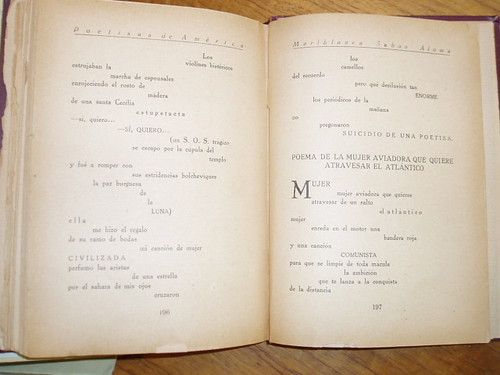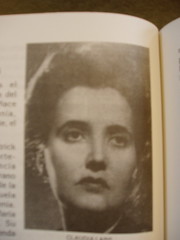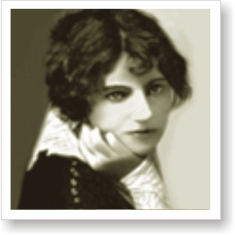Delmira Agustini
Delmira Agustini (1886-1914)
Agustini was part of the Uruguayan generation of 1900 along with María Eugenia Vaz Ferreira, Julio Herrera y Reissig, Leopoldo Lugones, and Rubén Darío; and was also considered part of the “generation of the Río de la Plata” of 1910-1920 (Camps 6). She was close to the Argentine writer Manuel Ugarte and to María Eugenia Vaz Ferreira. Early in her career, poets and critics like Juan Zorrilla de San Martin and Carlos Vaz Ferreira called her “The baby muse” and played up the image of her as a chaste, virginal child. Later, scandal accompanied her image as an artist and poet, her bohemian life and her tragic murder.
In 1902 Agustini began writing a regular column, “La legión etérea,” for La Alborada, a popular weekly journal, under the pseudonym “Joujou” (Rosenbaum 67-68). The column focused on prominent artistic and literary women.
She was considered a modernista, though a maverick “feminine” modernista who, outside mainstream literary circles, was one of “algunas figuras independientes . . . que introdujo una nota de honda y sensual femineidad en la poesía modernista” ‘a few independent figures . . . who introduced a note of depth and sensual femininity into modernista poetry’ (Henríquez Ureña 275). Other critics identify Agustini as part of a movement of women’s poetry: “It was perhaps Delmira Agustini who better represented a certain concept of feminine poetry: a poetry of passion and sensuality, a poetry written to challenge social conventions and to exalt eroticism unabashedly” (Rodriguez Monegal 1:368). Critics early in the 20th century often praise the technical perfection of her verse.
Fiera de amor
Fiera de amor, yo sufro hambre de corazones.
De palomas, de buitres, de corzos o leones,
No hay manjar que más tiente, no hay más grato sabor,
Había ya estragado mis garras y mi instinto,
Cuando erguida en la casi ultratierra de un plinto,
Me deslumbró una estatua de antiguo emperador.Y crecí de entusiasmo; por el tronco de piedra
Ascendió mi deseo como fulmínea hiedra
Hasta el pecho, nutrido en nieve al parecer;
Y clamé al imposible corazón . . . la escultura
Su gloria custodiaba serenísima y pura,
Con la frente en Mañana y la planta en Ayer.Perene mi deseo, en el tronco de piedra
ha quedado prendido como sangrienta hiedra;
Y desde entonces muerdo soñando un corazón
De estatua, presa suma para mi garra bella;
No es ni carne ni mármol: una pasta de estrella
Sin sangre, sin calor y sin palpitación . . .Con la esencia de una sobrehumana pasión!
Fierce from love
Made fierce by love, I’m starving for hearts.
Pigeon, vulture, dun deer or lion,
no meat tempts me more with exotic flavors.
I’d blunted my claws and my primal drives.
Then, set up on a plinth, almost otherworldly,
a statue dazzled me–an ancient emperor.And I fed my eagerness; over his stone body
my desire ascended like ivy lightning, sudden
up to his chest, feeding on skin like snow;
and I cried out to his unreachable heart . . . sculpture
guarding his glory, most chaste, still, and pure,
his face towards Tomorrow, feet rooted in Yesterday.Everlasting my desire; on the stone body
I’ve stayed pressed like a living blood-filled vine;
And since then, dreaming, I devour
a statue’s heart, prey worthy of my gorgeous claws;
it’s not flesh, not marble: the stuff of stars,
without blood, heat, or heartbeat . . .I devour it with deep, inhuman passion!
Nocturno
Engarzado en la noche el lago de tu alma,
diríase una tela de cristal y de calma
tramada por las grandes arañas del desvelo.Nata de agua lustral en vaso de alabastros,
espejo de pureza que abrillantas los astros
y reflejas la sima de la Vida en el cielo . . .Yo soy el cisne errante de los sangrientos rastros,
voy manchando los lagos y remontando el vuelo.Nocturne
Lake of your soul, gem-mounted in night,
you would tell a thread of crystal and calm
spun by the huge spiders of wakeful evening.Lustral waters born in alabaster cups,
mirror of purity where the stars shine
and reflect the abyss of Life in the heavens . . .I am the wandering swan of bleeding trails,
I’m dirtying the lakes and soaring in flight.



